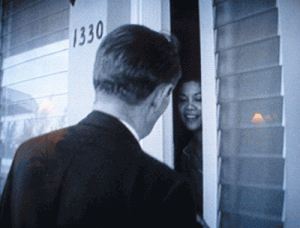 Salesman, 1968. Directed by Albert Maysles, David Maysles, and Charlotte Zwerin. With Paul “The Badger” Brennan, Charles “The Gipper” McDevitt, James “The Rabbit” Baker, Raymond “The Bull” Martos, Dr. Melbourn I. Feltman, Kennie Turner, and scores of potential customers.
Salesman, 1968. Directed by Albert Maysles, David Maysles, and Charlotte Zwerin. With Paul “The Badger” Brennan, Charles “The Gipper” McDevitt, James “The Rabbit” Baker, Raymond “The Bull” Martos, Dr. Melbourn I. Feltman, Kennie Turner, and scores of potential customers.
The cruelest merchandise is a talent for which there is no demand. –A.J. Liebling, “People in Trouble”
Salesman, the Maysles Brothers’ and Charlotte Zwerin’s profound documentary about roving Bible sellers, opens with a failure. We see Paul Brennan, a slight man, his suit tight in spots and loose in others, lacking a chin and with hands gnarled from arthritis, desperately trying to make a sale. He’s showing off the beauty of his product: a Catholic Press Leather-Bound and Illustrated edition of the Good Book. “Do you think this would be a benefit to you in your home?” he asks. The woman of the home, in curlers, her child hanging all over her, mumbles a “yes”, knowing damn well that any “yes” exposes her limited finances to plunder. But she resists, says she can’t afford the thing, and finally invokes her husband, who is not home to make the decision.
Paul is defeated, and bites his lip. The camera freezes on him as his name appears onscreen: Paul Brennan–”The Badger.” But we can see, very clearly, that The Badger’s claws and teeth are worn , his fight is nearly gone, and his time in this field is limited.
Salesman is a truly incredible movie, as simple, and yet complex, as a bad day. The Maysles followed four salesman through New England and then Florida, and filmed them and their potential customers, edited the footage, and created not only a searing document about the life and struggles of American salesmen, but a compelling and entertaining movie that is as riveting as anything you’ll see.
We open with a few clips of each man, pounding on doors, checking their leads, driving through the snowy Boston streets, looking to get into the house, sit at the kitchen table, and start pitching these $50 books (a fortune in the late 60s). Right from the beginning we notice the trajectory of each man: Brennan, once a great salesman, is now on the ropes, his sales pitches limned with desperation, or descending into a full-fledged confession (“My brother went to school he was classified a genius. When I followed him, everybody used to say ‘where did you come from?’ So I have an inferiority complex.”) Charles, a giant, is a damn good salesman, but easily ruffled and frustrated. James, thin, eyes darting, has the benefit of youth, but he can’t shut up. And then there’s Raymond, who you can barely hear (in fact, I think his lines were dubbed in later), and whose presence somehow comforts his customers–he is by far the best of this motley crew.
None of these men are liars and thieves. It would be easy to categorize them as such, but truly they are just folks trying to make a living. You get to see the lies that are not really lies. “We’re with the church, ma’am,” is a common one. These men aren’t really with the church, but the local Catholic diocese has allowed the company to set up a display in the neighborhood house of worship, and parishioners put their names in a box, and are summarily contacted. They made a choice. And each one of these men were no doubt lured to the profession by the promise both of money and the notion that they were doing something good. How can a bible be a bad thing?
Desperation, perhaps, is what makes it a bad thing. Raymond seems to be the only one who does not have to push his customers into making a choice that will hurt them financially. The rest do nearly anything they can, layering on the guilt. But so, too, does the company–a regional meeting is both a ridiculous display of boasting (“I’m going to make $50,000 this year. I think I can do it.”) and a chance for the browbeaten (Paul most notably) to re-energize after hearing an inspirational speech by the founder (“Some of you at one time or another have had a higher income, but you have never had a higher position of esteem in the eyes of the world. Hold your heads very high, be proud of your position.”) I don’t know if the Maysles were trying to make a damning examination of the shallowness of capitalism or modern religion, but Salesman works so well because of its honesty, and the fact that they chose to follow these men and let them tell the story and allow their audience to come to our own conclusions.
Honestly, I haven’t a clue as to how the Maysles’ pulled this off. See, I’ve been a salesman before, a canvasser really, going door-to-door for four long years peddling the good word about the environment. Good citizens signed a petition, and then were browbeaten into coughing up a donation, or else they were foes of Mother Earth. It was the same thing, less an actual product you could show off to the customer. But we had the wide-eyed kids and the broken, cynical elders (I went from one to the other.) There were lies and cruelties, and, as in Salesman, moments of shared joy and very, very bizarre people, both in the field and with the organization.
But I would never have agreed to have a pair of guys with cameras at my back while I tried to sell–that would have spooked either me or my mark. Somehow, they managed to remain invisible–only once did I notice a customer looking into the lens. And the details are so similar to canvassing, I just had to laugh at times, having lived this so many, many times.
Such as the ‘rap’ meeting that goes completely awry. We used to have these all the time–every sales job goes through these motions, training sessions that serve as either a catharsis or fantasy. Here, the crew leader, a bulldog-type fellow who never ceases to tell his men they’re whiners and failures, comes into a room, where our four salesmen wait. He begins a pitch to show these loafers that he can sell to anyone, and they’re supposed to play the ‘difficult’ customer. Typically, these things are either too easy, or disastrously difficult–the salesmen want reassurance (too easy) or a chance to show how Goddam hard their jobs are to the man (too hard).
Here, amazingly, James takes a brilliant tack in this game: his plays a man whose wife is of a different faith, but might convert, and he’s worried that spending the money on this bible will “push her away.” Unruffled, the leader spars with James, pointing out that he’s the “man in the house”, and “there’s no reason you shouldn’t have it.” James, playing the customer, is convinced, when suddenly Charles decides to play brother-in-law, and adds that this is going to be a disaster. “I was just thinking of that statue, and that didn’t cost anything like this, and she was peeved.” The boss is thrown utterly off-kilter, subtly insulting both the customer and his brother-in-law (who James, wittily, claims is “my best friend in the world”), and who, in reality, would never have made the sale.
This is just one of the pristine moments that Salesman so riveting, so full of pleasant surprises. It is a film about a thing that is, for good or bad, a central part of this country. It neither damns nor praises this thing, this need to sell. The Maysles seemed to understand that selling makes you feel important, a part of the machine, it makes you feel independent, just as makes you feel sleazy and wrong.
I’ve seen some of these Bibles at estate sales around town at estate sales. They’re shoddy, with cheap leather, photos of classic religious art that was mediocre even then, nothing at all to cherish past a few years when the spine begins to crack and the cover tear. I think these guys knew they were cheap. Apparently, Paul left his eight-year job as a Bible salesman shortly after the Maysles finished shooting. He was an actor, a salesman, a jack-of-all-trades, and never really settled down. He died of rhumatoid arthritis years later.
And we look at him, there, sitting in his car, telling stories about the other salesman, or staring out the window of the El, heading to a sales meeting that he knows is going to be the same old bullshit. Paul’s smart. But he has nowhere to go, nothing to do in his life, a vague talent which has no home. Which, as Liebling says, is the cruelest merchandise to peddle.

